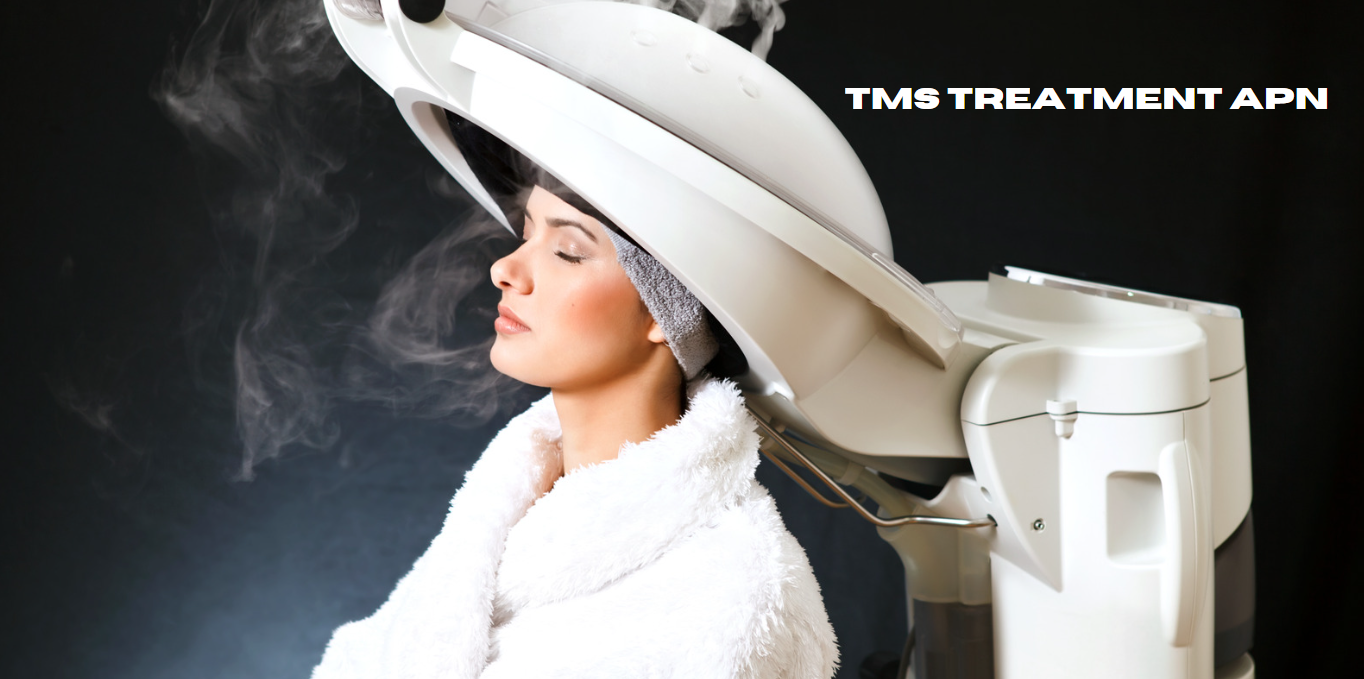Contents
Introduction
Transcranial Magnetic Stimulation (TMS) is an innovative and noninvasive procedure that has revolutionized the treatment of major depression and other mental health conditions. This article delves deep into the intricacies of TMS treatment, particularly focusing on its application within the realm of Advanced Practice Nursing (APN).
We will explore the science behind TMS, its effectiveness, the role of APNs in administering this treatment, and how it compares to other therapeutic options. Furthermore, the content will be optimized for the keyword “tms treatment apn” to ensure it ranks highly in search engine results, providing valuable insights to healthcare professionals and patients alike.
What is TMS Treatment?
Understanding Transcranial Magnetic Stimulation (TMS)
Transcranial Magnetic Stimulation (TMS) is a noninvasive procedure that utilizes magnetic fields to stimulate nerve cells in the brain. The primary goal of TMS is to improve symptoms of major depressive disorder (MDD) and other psychiatric conditions. TMS is particularly appealing because it does not require surgery, anesthesia, or any form of systemic medication, making it a highly targeted and safe treatment option.
How TMS Works
TMS treatment involves placing an electromagnetic coil against the patient’s scalp near the forehead. The device generates magnetic pulses that penetrate the skull and induce electrical activity in specific regions of the brain, particularly the prefrontal cortex. This region is associated with mood regulation, and by stimulating it, TMS can help alleviate depressive symptoms.
- Mechanism of Action: The magnetic pulses used in TMS create small electrical currents that stimulate nerve cells in the targeted brain region. This stimulation is believed to enhance synaptic plasticity, which can lead to improvements in mood and cognitive function.
- Procedure Overview: A typical TMS session lasts about 30 to 40 minutes. During the session, the patient remains awake and alert. The treatment is administered daily over several weeks, with the number of sessions varying depending on the patient’s response to therapy.
Indications for TMS Treatment
TMS is primarily used to treat major depressive disorder, especially in patients who have not responded to traditional treatments such as medication and psychotherapy. It is also being explored for other conditions, including:
- Anxiety Disorders: TMS has shown promise in reducing symptoms of generalized anxiety disorder (GAD) and post-traumatic stress disorder (PTSD).
- Obsessive-Compulsive Disorder (OCD): TMS is FDA-approved for treating OCD, offering a new avenue for patients who do not respond to conventional therapies.
- Chronic Pain: Research suggests that TMS may help alleviate chronic pain conditions, including fibromyalgia.
- Substance Use Disorders: Emerging studies are investigating the potential of TMS in reducing cravings and relapse in patients with addiction.
The Role of Advanced Practice Nurses (APNs) in TMS Treatment
Who are Advanced Practice Nurses?
Advanced Practice Nurses (APNs) are registered nurses with advanced clinical training and education, typically holding a master’s or doctoral degree in nursing. They are qualified to perform a range of healthcare services, including diagnosing and treating medical conditions, prescribing medications, and managing patient care. APNs include Nurse Practitioners (NPs), Clinical Nurse Specialists (CNS), Certified Nurse Midwives (CNM), and Certified Registered Nurse Anesthetists (CRNA).
APNs in Mental Health Care
In the realm of mental health care, APNs play a critical role in delivering comprehensive and holistic care to patients. They are often involved in diagnosing mental health conditions, developing treatment plans, and providing psychotherapy. Given their expertise and clinical authority, APNs are well-positioned to administer and oversee TMS treatment.
Administering TMS Treatment: The APN’s Role
APNs involved in TMS treatment are responsible for various aspects of patient care, from initial consultation to ongoing monitoring and follow-up.
- Patient Assessment: Before initiating TMS treatment, APNs conduct thorough assessments to determine if the patient is a suitable candidate for the procedure. This includes evaluating the patient’s medical history, current medications, and the severity of their condition.
- Treatment Planning: APNs develop individualized treatment plans tailored to the patient’s needs. They determine the appropriate frequency and duration of TMS sessions and make adjustments based on the patient’s response to therapy.
- Administering the Procedure: While the actual TMS procedure is often performed by trained technicians, APNs oversee the treatment to ensure it is conducted safely and effectively. They monitor the patient’s response during each session and address any side effects or concerns.
- Follow-Up Care: APNs provide ongoing support and follow-up care after the completion of TMS treatment. This may include additional therapy sessions, medication management, or referrals to other mental health services.
Training and Certification for APNs in TMS
To administer TMS treatment, APNs must undergo specialized training that covers the principles of TMS, patient selection criteria, and the technical aspects of operating TMS equipment. Certification programs are available through professional organizations such as the Clinical TMS Society, which offers courses designed to equip APNs with the knowledge and skills required to provide TMS treatment safely.
Effectiveness of TMS Treatment
Clinical Evidence Supporting TMS
Numerous studies have demonstrated the effectiveness of TMS in treating major depressive disorder, particularly in patients who have not responded to other forms of treatment.
- Response Rates: Clinical trials have shown that approximately 50-60% of patients with treatment-resistant depression experience significant improvement in their symptoms with TMS, and about one-third achieve complete remission.
- Long-Term Benefits: Research indicates that the benefits of TMS can be long-lasting, with many patients maintaining their improvements for several months to years after completing treatment. Some patients may require maintenance sessions to sustain the therapeutic effects.
- Comparison to Other Treatments: TMS is often compared to other treatment modalities such as electroconvulsive therapy (ECT) and medication. While ECT is more effective in severe cases, TMS offers a better side effect profile, with fewer cognitive side effects and no need for anesthesia.
TMS for Other Psychiatric Conditions
In addition to depression, TMS is being studied for its potential to treat a range of other psychiatric conditions.
- Anxiety Disorders: Studies suggest that TMS can reduce symptoms of anxiety, particularly in patients with comorbid depression and anxiety. The mechanism of action is believed to involve modulation of the brain circuits associated with fear and anxiety.
- Obsessive-Compulsive Disorder (OCD): TMS has been FDA-approved for treating OCD, with research showing that targeted stimulation of the prefrontal cortex can reduce obsessive-compulsive symptoms.
- PTSD: Preliminary research indicates that TMS may be beneficial for patients with PTSD, particularly when combined with other forms of therapy such as cognitive-behavioral therapy (CBT).
Limitations and Considerations
While TMS is a promising treatment, it is not without limitations.
- Patient Suitability: TMS is not effective for all patients, particularly those with certain types of depression or comorbid medical conditions. Additionally, patients with metal implants or a history of seizures may not be eligible for TMS.
- Side Effects: Common side effects of TMS include headaches, scalp discomfort, and tingling sensations. These side effects are generally mild and temporary, but some patients may experience more significant discomfort.
- Access and Cost: TMS treatment can be costly, and not all insurance plans cover the procedure. Access to TMS may also be limited in certain geographic areas, particularly in rural or underserved communities.
TMS Treatment APN: Addressing Common Questions
FAQs
What is TMS Treatment APN?
TMS Treatment APN refers to the administration of Transcranial Magnetic Stimulation by Advanced Practice Nurses. APNs are healthcare professionals with advanced training who are qualified to oversee and administer TMS treatment to patients with depression and other mental health conditions.
How effective is TMS treatment for depression?
TMS treatment has been shown to be effective in 50-60% of patients with treatment-resistant depression, with about one-third of patients achieving complete remission. The benefits of TMS can be long-lasting, with many patients experiencing sustained improvements in their symptoms.
What are the side effects of TMS treatment?
Common side effects of TMS treatment include headaches, scalp discomfort, and tingling sensations. These side effects are generally mild and temporary, resolving shortly after the treatment session.
Can APNs administer TMS treatment?
Yes, APNs with specialized training in TMS are qualified to administer the treatment. They are responsible for patient assessment, treatment planning, and ongoing monitoring of the patient’s response to therapy.
Is TMS treatment covered by insurance?
Coverage for TMS treatment varies by insurance provider. Some insurance plans may cover the cost of TMS for patients with treatment-resistant depression, while others may require pre-authorization or have specific eligibility criteria.
Future Directions in TMS Treatment
Innovations in TMS Technology
As TMS technology continues to evolve, there are ongoing efforts to improve the precision and efficacy of the treatment. Newer TMS devices are being developed with advanced targeting capabilities, allowing for more precise stimulation of specific brain regions. Additionally, researchers are exploring the use of individualized treatment protocols based on neuroimaging data, which could further enhance the effectiveness of TMS.
Expanding the Indications for TMS
The potential applications of TMS are expanding beyond depression to include a broader range of psychiatric and neurological conditions. Ongoing research is investigating the use of TMS for conditions such as bipolar disorder, schizophrenia, and Alzheimer’s disease. As the evidence base grows, it is likely that TMS will become an increasingly important tool in the treatment of mental health disorders.
The Role of APNs in the Future of TMS
As the demand for TMS treatment continues to grow, APNs will play a critical role in expanding access to this therapy. With their advanced clinical training and expertise in mental health care, APNs are well-positioned to lead the way in delivering high-quality TMS treatment to patients. This includes not only administering the treatment but also contributing to research and innovation in the field of TMS.
Conclusion
TMS treatment APN represents a significant advancement in the treatment of major depression and other mental health conditions. With its noninvasive nature, effectiveness, and expanding indications, TMS offers hope to patients who have not found relief through traditional therapies.
Advanced Practice Nurses are at the forefront of this therapeutic revolution, bringing their expertise and compassion to the delivery of TMS treatment. As research continues to explore new frontiers in TMS, the role of APNs will become even more integral to the future of mental health care.
This comprehensive guide on “tms treatment apn” provides an in-depth look at the science, practice, and future of TMS treatment, with a focus on the critical role of APNs in delivering this innovative therapy. Whether you are a healthcare professional, a patient, or someone interested in the latest developments in mental health treatment, this article offers valuable insights and information that go beyond what is currently available online.







